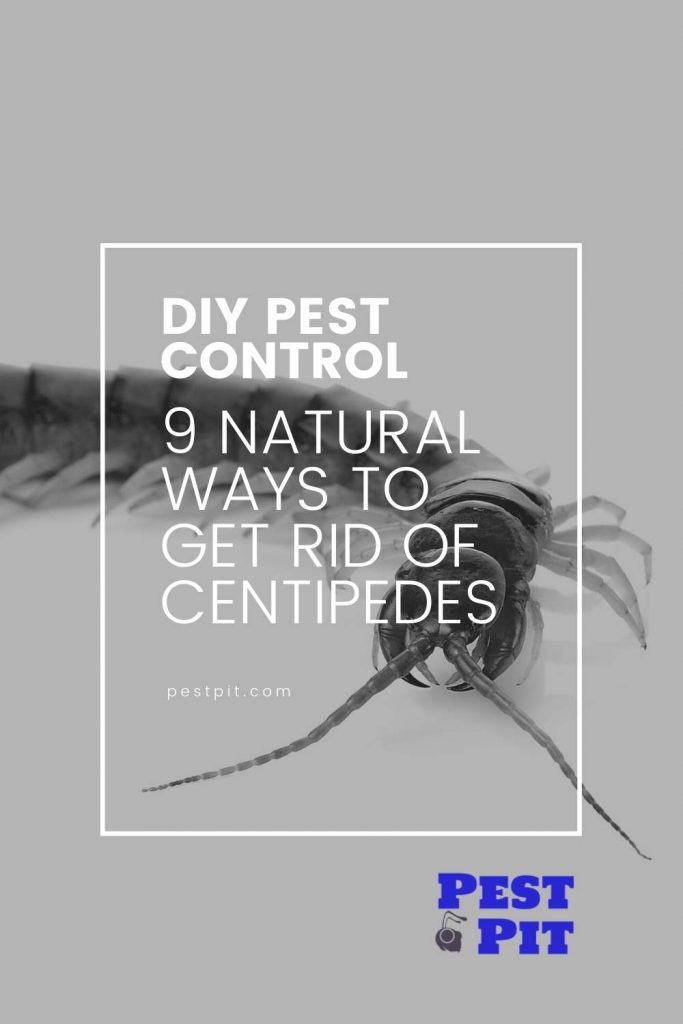There’s nothing more startling than watching a centipede dash across your floor and under your furniture; they may not be the most destructive of household pests, but they sure are a nuisance.
Here’s how to quickly, easily, and naturally get centipedes out of your home.

What Attracts Centipedes to Your House?
Centipedes are drawn to dampness, nourishment, and shelter – usually in that order. If your home provides these necessities, you likely have a few lurking around.
This is vital information if you want to know how to keep centipedes away from your home.
Dampness
Unlike most arthropods, centipedes don’t have a moisture-preserving cuticle. Instead, they need a reliable source of moisture to keep it from drying out. They can’t remain active or hunt for long without it.
Consequently, they are drawn to dark, moisture-laden environments that stay that way all year.
Nourishment
When centipedes invade your home, it’s likely because they are looking for food. If they find prey near your house, they might unintentionally chase it in.
Centipedes feed on soft-bodied creatures such as worms, spiders, and small insects.
Shelter
Once they get inside, they’re unlikely to leave if they find lots of clutter. Centipedes like concealed spaces from which they can spring ambush attacks while hunting.
Bags, boxes, and debris inside your house will serve them well.
Natural ways to get rid of centipedes
Reduce indoor humidity
As we have discussed, the house centipede is attracted to humidity.
If you have a water faucet on the side of your home or an outdoor shed, plumbing leaks may create patches of moisture. Sealing these leaks will reduce the amount of dampness in your home and discourage centipede infestations.
Besides checking your plumbing, you may install a dehumidifier. It regulates humidity by removing excess moisture from the air, creating an environment that centipedes find inhospitable.
Remove food sources
Centipedes are wholly carnivorous. By eliminating their prey, you’ll force them to relocate. Use insecticides or any other means necessary to kill all the stray insects in your house. This should convince the centipedes to go elsewhere.
A ready food source is a common reason you have centipedes in the house.
Catch them
Centipedes may be agile, but they rarely invade in overwhelming numbers. So if you can capture the ones you see, you’re well on fixing the problem.
Trap the rogue centipede under a cup or jar
Slide a piece of paper over the mouth of the container,
Deposit the bug outside, preferably somewhere far from your home.
Note 1: Don’t touch a centipede with unprotected hands. Although they aren’t likely to attack humans, one might bite you in the interest of self-preservation; its bite can be comparable to a bee sting.
Pro Tip: If you’re not up to the challenge of chasing the centipedes down, use glue traps. They are highly effective at capturing all types of insects.
Centipede sticky traps
Sticky traps are small glue-smeared cards often used in pest control. They are ideal for catching centipedes and monitoring the progress of an infestation. All you have to do is position the traps in the dark and damp areas within your home, where centipedes are most likely to converge.
Note: glue traps are only effective against small centipedes. If you find leg parts on the trap without a body, you likely have a large centipede lurking in your house.
How to make your centipede sticky traps
If you don’t have the time to buy sticky insect traps, you can quickly make some in a few short steps.
What you’ll need.
4 cups water, 4 cups corn syrup, large pan
Bright colored construction paper
Paintbrush
Instructions
(a) Boil the corn syrup and water in a large pot.
(b) Cut the construction paper into appropriate sizes.
(c) Use your brush to apply the gel onto one side of the paper cut-outs, then set each piece in the damp corners where centipedes like to converge.
Use natural pesticides
Want to know how to get rid of centipedes in your home? Take a look at these 5 natural pest control methods.
Diatomaceous earth
One of the best natural pesticides you can use against centipedes is diatomaceous earth. It is a soft, naturally occurring material created from diatomite. Diatomaceous earth has excellent desiccating properties, which makes it an effective bug-killer. It kills centipedes by absorbing moisture from their bodies.
To use DE, you must sprinkle the powder in all the corners where you expect centipedes to converge.
Note: Although the substance is harmless to pets and humans, wear a mask or respirator while applying it, so you don’t breathe it in.
Soap spray
Like diatomaceous earth, soap spray is an effective desiccant that breaks down the oils and waxy compounds that help centipedes retain moisture.
Once this happens, the centipedes dry up and die. For this to work, you’ll have to spray the centipedes as they appear.
Peppermint oil
Centipedes can’t stand peppermint oil; its scent is repulsive and burns their skin. Squeeze 25 drops of the oil into a spray bottle with a 3/4 cup of water. Apply the spray onto door frames, windows, basement doors, and small cracks.
Repeat this process every 7 days to keep centipedes away.
Cayenne pepper
While it’s effective, you should only use cayenne pepper as a last line of defense, particularly if you own pets who could get curious. It is not lethal but will cause severe irritation if inhaled by animals.
Apply a thin line of cayenne paper near all entrance points to your house (both inside and outside); it will naturally keep the centipedes out of your home.
Clean your house
Cleaning the crevices and corners of your home with a vacuum cleaner will suck up centipedes hidden from view. Remember to dispose of the vacuum cleaner’s contents far away from your premises, so the centipedes don’t run back into your house.
Pro Tip: Remember to check the weather stripping on your doors and windows. It wears away with time, losing its ability to keep insects out. Replacing it will deny centipedes entry.
What eats centipedes?
House centipedes fall prey to various animals, including domestic chickens, toads, shrews, birds, and badgers.
Furthermore, healthy centipedes sometimes attack and devour their injured counterparts; they become violent and defensive when nearby.
Conclusion
House centipedes can be annoying, but with the advice covered here about preventing centipedes, you should have everything under control.
Their presence may indicate a more severe problem, such as a spider or cockroach infestation.
Be sure to check around the house for signs of other infestations. Catching them early will spare you lots of money.
Good luck!

